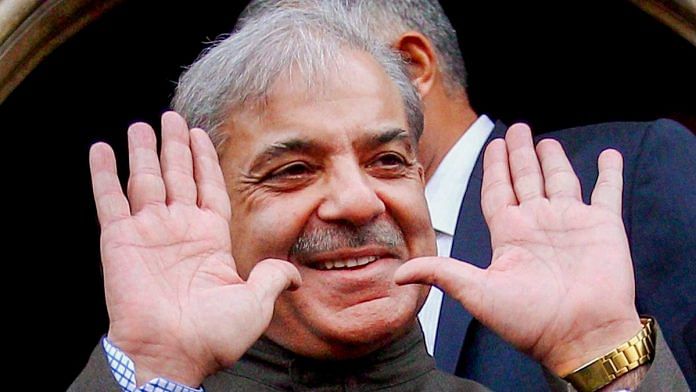New Delhi: Pakistan’s Inter-Services Intelligence can now listen to any phone call in the country. The Pakistan government has officially granted the agency the authority to intercept and trace phone calls and messages under section 54 of the Pakistan Telecommunication Act 1996.
Pakistanis are not surprised, calling the process ‘making it official’.
This move to empower the ISI with increased surveillance capabilities coincides with the Shehbaz Sharif government’s efforts to impose stricter regulations on social media platforms, citing concerns related to national security, including the recent ban on social media platform X.
These are not the only instances of the Pakistan government impinging on citizens’ digital rights in the name of national security.
Similar moves in the past
Earlier in May 2024, Sharif had also approved a draft amendment to the Prevention of Electronic Crimes Act (PECA) 2016 — initiating the establishment of a Digital Rights Protection Authority (DRPA).
Under this, Pakistan is currently rolling out a national firewall across various internet service providers (ISPs) to filter and block undesirable content on social media platforms.
Before being fully accessible online, all dissenting voices, whether domestic or international, are likely to undergo scrutiny through an inspection process, which includes major social media platforms such as Facebook, YouTube, and X, Aaj TV reported.
Even VPNs won’t be spared. Social media users have been actively using VPNs to access X after the ban on the site in February 2024.
The government may mandate individuals to declare the VPN services they use to the Pakistan Telecommunication Authority (PTA), with potential legal consequences for non-compliance, the Aaj TV report further added.
In the seminal case of Benazir Bhutto phone tapping in 1997, the Supreme Court had termed the Act “reprehensible, immoral, illegal and unconstitutional”.
In an opinion piece in Dawn from April 2023, journalist Zahid Hussain had highlighted how rampant phone tapping by intelligence agencies in Pakistan—a leaked audio clip allegedly involving a relative of a Supreme Court judge and Imran Khan’s wife Bushra Bibi discussing early elections, legislation to regulate the powers of the chief justice, and the prospect of martial law— impacted political rivals and public officials alike, leading to widespread scandal and erosion of trust in state institutions.
“The ongoing political power struggle and weakening of the rule of law has allowed the intelligence agencies greater space in which to operate. The increasing power of the intelligence agencies and the security establishment is nothing short of ominous,” said Hussain’s article.
Hussain also added that while Pakistan Tehreek-e-Insaf (PTI) was being specifically targetted, Khan’s call for action contrasts with his past justifications for similar actions against opponents.
Rulings fall on deaf ears
Speaking to ThePrint, Omer Imran Malik, advocate, High Court of Pakistan, and an international privacy lawyer focusing on digital rights, freedom of speech and surveillance laws, said that the carte blanche authority granted under Section 54 of the Telecommunication Act 1996 to the Inter Services Intelligence Agency by the Federal Government is unconstitutional, as it undermines citizens’ rights to privacy and freedom of speech guaranteed by the Constitution of Pakistan. The law requires judicial authorisation based on a demonstrated threat to national security, as emphasised by legal precedent and subsequent legislation like the Fair Trial and Investigations Act 2013, which mandates judicial oversight for surveillance activities.
“The carte blanche granting of authority under Section 54 of the Pakistan Telecommunication Act 1996 (PTA Act) by the Federal Government to the Inter Services Intelligence Agency is not in line with Pakistan’s legal or constitutional disposition. Thus, it cannot be granted because it would be an unreasonable and overbroad restriction to citizens’ right to privacy and freedom of speech,” he said.
Arguably, a reasonable interpretation of Section 54 of the PTA Act would require the Federal Government of Pakistan to first make a strong case to establish a threat to national security or the occurrence of an offense to a court of law and then only receive judicial authorisation to conduct the targeted surveillance activities to curtail that specific enumerated threat. Since the federal government has failed to establish anything of that nature and has only released an unreasoned and broad notification, this development should not stand a test before a constitutional court,” he added.
Earlier this year, the Islamabad High Court prohibited telecom companies from conducting surveillance by recording citizens’ telephone conversations, adding that no government entity, including the Prime Minister’s Office or the PTA, is authorised to engage in such activities. It also mentioned that illegal surveillance is punishable under the law, the Express Tribune reported.
Moreover, since 2013, the Investigation for Fair Trial Act has mandated that phone-tapping operations must be approved by a commission or the Supreme Court on a case-by-case basis, limited to six weeks per authorisation.
The ruling seems to have fallen on deaf ears, and with this new notification, Pakistanis are doing what they know best—using self-deprecating humour to cope.
They know there’s nothing new in this formalisation. What they find funny is their digital rights being snatched in the name of national security.
“This government and crime prevention?” one Instagram user asked sarcastically while another said that this could be a good lesson for Gen-Z kids to now know how it felt to share secrets and gossip in person.






